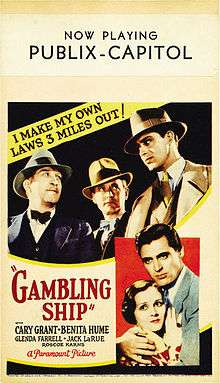Gambling Ship
| Gambling Ship | |
|---|---|
 Movie poster | |
| Directed by |
Louis J. Gasnier Max Marcin |
| Written by |
Claude Binyon Max Marcin |
| Starring |
Cary Grant Benita Hume |
| Cinematography | Charles Lang |
| Distributed by | Paramount Pictures |
Release dates | June 23, 1933 |
Running time | 72 minutes |
| Country | United States |
| Language | English |
Gambling Ship is a 1933 American Pre-Code drama film starring Cary Grant and Benita Hume. Directed by Louis J. Gasnier and Max Marcin, the film was based on the short stories "Fast One", "Lead Party", "Velvet" and "The Heat" by Paul Cain which was published in the Black Mask magazine. It was released by Paramount Pictures on June 23, 1933.[1][2] Tired of the dangerous life as gambling boss, Ace Corbin retires from the racket, but old enemies won't let Ace begin his new life.
Plot
Ace Corbin (Cary Grant) a charming Chicago gangster is acquitted of murder charges, which was framed by Pete Manning (Jack La Rue) decides to reform and begin a new life in California. On the train, he falls in love with Eleanor La Velle (Benita Hume) a gambler's girlfriend. They both conceals their true identities and has adopted new aliases. In Southern California, Eleanor discovers that her lover, Joe Burke owner of the Casino Del Mar steamer, which operates legally outside the three-mile limit from the harbor is in debt for $9,000. Because Pete Manning's thugs are ruining his business.
Eleanor chooses to remain loyal and help Joe with his business, rather than desert and leave him for Ace. Joe and his right-hand man Blooey (Roscoe Karns) offer to turn over the casino to Ace, so he can improve the business and seek vengeance on Manning. Ace resists becoming involved until Manning's men threaten him. When Ace runs the casino he thwarts Manning's customers by commandeering the water taxis over to his steamship instead. The first evening, Ace encounters Eleanor on board the ship and she discovers his true identity. Eleanor who is still in love with Ace remains on the ship, even after Manning's men cause an explosion and fire on board.
When the customers have left the ship safely and the fire is out, Ace and Eleanor remains on board for the night. In the morning, the district attorney questions them both and Ace discovers Eleanor's real identity, including her relationship with Joe. Also in attendance is Joe, who likewise discovers Ace and Eleanor's relationship. Back aboard the casino steamship, during a storm Joe and Ace accuse Eleanor of being a two-timer and lying to them both. Meanwhile, Manning and his man sneak on board the ship and kills Joe. Blooey releases the anchor and the crashing waves wash Manning and his man off the deck. Ace, Blooey, and Eleanor jump to safety with life preservers. later, on a train Ace and Eleanor are married.
Cast
- Cary Grant as Ace Corbin
- Benita Hume as Eleanor La Velle
- Jack La Rue as Pete Manning
- Glenda Farrell as Jeanne Sands
- Roscoe Karns as Blooey
- Arthur Vinton as Joe Burke
- Charles Williams as Baby Face
- Edwin Maxwell as D.A.
- Spencer Charters as Detective
Production
Carole Lombard was considered for the role of Eleanor La Velle. A technical advisor was used to familiarize the actors in the film with the details of the parlance, activities, and manners of the gambling world. To maintain his anonymity he was known only as "Mr. 100". Some of the scenes in the movie was shot in San Pedro, California.[3]
Reception
The New York Times movie review said: "For this stale and profitless narrative, the producers have gathered an attractive cast. Although they are wasted in the leading rôles, Cary Grant is a likable and intelligent actor and Benita Hume is a charming British actress. Roscoe Karns is helpful on the humorous side and Jack La Rue gives one of his vivid reptilian performances as the leader of the opposition gang."[4]
Home media
Gambling Ship was released on DVD in September 28, 2016.
References
- ↑ "Gambling Ship (1933)". All Movie. Retrieved September 9, 2016.
- ↑ "Gambling Ship". Moviefone. Retrieved September 9, 2016.
- ↑ "Gambling Ship". American film Institute: catalog of feature films. Retrieved September 9, 2016.
- ↑ "MOVIE REVIEW: More on Gangsters". The New York Times. July 13, 1933. Retrieved September 9, 2016.